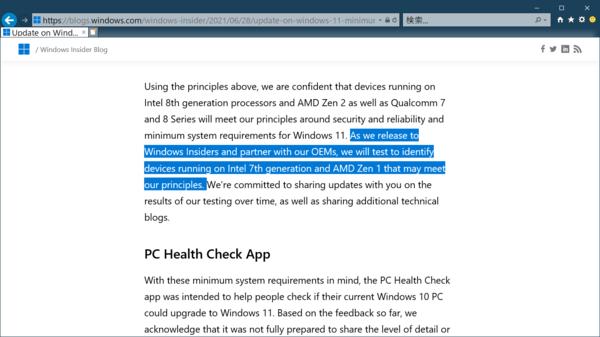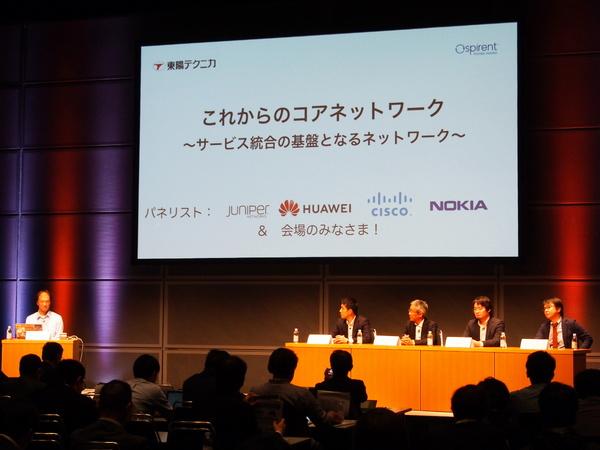Is the CPU that can be upgraded to...
08
05
Is the CPU that can be upgraded to Windows 11 basically 8th generation / Zen + or later?
Some 7th / Zen generation PCs can be upgraded to Windows 11 !?
The preview version of Windows 11 is now available on Windows Insider Preview. Also, there was a small update regarding the upgrade conditions for Windows 11.
Regarding the updated conditions for upgrading Windows 11, the blog says, "By releasing to Windows Insiders and partnering with OEM manufacturers, we have identified devices with Intel 7th generation and AMD Zen 1 that meet our principles. I'll do a test to do that. "
Initially, it was said that Windows 11 could be upgraded to Intel's 8th generation or later, and AMD's Zen + generation or later. However, Microsoft's blog, which was published after that, said that it would investigate and report with the PC manufacturer whether the 7th generation and Zen generation PCs are suitable for the upgrade.
Even PCs made by 7th / Zen generation manufacturers may be able to be upgraded if they meet the "Principal" set by Microsoft. If only the CPU specs determine whether or not it can be installed, this is not the case. In other words, there are some conditions other than the CPU specifications.
The preview version of Windows 11 currently distributed can be installed on PCs of 7th generation or earlier because there is no check at the time of installation. In my environment, I was able to install it in the 4th generation, but the installation failed in the 3rd generation. At least Windows 11 itself works on older PCs.
Windows 11 from Windows Insider Preview could be installed on Intel's 4th generation CPU machines as well.
Surface Pro (first generation) equipped with a 3rd generation CPU failed to install Windows 11.The version went up, but it still looks like Windows 10.
The upgrade conditions for Windows 11 are determined by whether or not they meet the "principles" decided by Microsoft, and are not technical conditions that work or do not work. This is probably related to the Specter / Meltdown vulnerability released in 2018 (hereinafter referred to as Specter / Meltdown including these variants). Simply put, Intel 8th generation, AMD Zen + generation and later, which have Specter / Meltdown measures from the beginning, were targeted for Windows 11 upgrade.
Specter / Meltdown was discovered in 2017, but since it affected a wide range of CPUs equipped with speculative execution (at least Intel, AMD, ARM), prioritizing countermeasures before release, the announcement was announced. I was laid down until January 2018. The 7th generation and Zen generation CPUs were affected by this. According to Project Zero, which discovered Specter / Meltdown, CPU makers were officially notified in June 2017.

● Project Zero Blog "Reading privileged memory with a side-channel" https://googleprojectzero.blogspot.com/2018/01/reading-privileged-memory-with-side.html
For CPUs shipped before June 2017 (2017Q2), it was necessary to use a microcode patch. Kaby Lake was a product that was just on the border. In other words, since Specter / Meltdown was discovered after Kaby Lake started shipping, Kaby Lake will either redesign and change the stepping (redesign time is required) or update the microcode (change the firmware on the PC side). Was necessary), but only one of them could be taken.
On the other hand, for the 8th generation Coffee Lake, Specter / Meltdown was discovered before shipping, so it was possible to ship countermeasure products.
The same is true for AMD, where Specter / Meltdown was discovered during the shipment of the first Zen generation, and it was necessary to take the same measures as Intel's 7th generation. Since the Zen + generation will be shipped after that, it is probable that the countermeasure product was shipped.
I don't want to deal with CPU vulnerabilities in the OS anymore
In other words, the first Windows 11 upgrade condition, 8th generation / Zen + generation or later, may have been a delineation condition whether or not Specter / Meltdown measures were taken from the beginning. Why did Microsoft stick to this? That's probably because in Windows 11, we want to eliminate the "mitigation" and "countermeasures" for Specter / Meltdown.
The Specter / Meltdown response caused the system to slow down. With CPU microcode updates, the range of modifications is limited, so it is easy to choose between safety and speed. Measures on the software side also reduce processing efficiency. With SpecterV2 (Branch Target Injection), CPU microcode updates were not enough, and Windows was forced to take measures.
Therefore, "mitigation measures" were introduced. The method is to rewrite the program to code that is not affected by Specter / Meltdown. One of the software mitigations, "retpoline," can circumvent Specter V2 by replacing the Jump instruction with a Push and Ret instructions. The execution mechanism is different between the Jump instruction and the Ret instruction, and the branch target buffer (the mechanism that stores the branch destination) that causes Specter V2 is not used in the Ret instruction. However, since the number of instructions increases, it is not possible to maintain the same speed as before applying the mitigation measures. Thus, "mitigation measures" reduced the efficiency of Windows.
Since Windows and other current operating systems are written in high-level languages, it is necessary to rewrite the compiler to realize mitigation measures such as retpoline. These mitigations and compiler modifications could cause other problems. In fact, the Windows mitigation update seems to have caused problems such as the game app not launching.
Furthermore, since the retpoline method is similar to the attack method ROP (Return Oriented Programming) from malicious programs, it affects the CET (Control-Flow Enforcement Technology) installed in Intel's Tiger Lake. In order to use it with this generation of CPU, it is necessary to remove mitigation measures such as retpoline.
Microsoft probably doesn't want to incorporate these Specter / Meltdown-related mitigations and workarounds into Windows 11 anymore. In the first place, Specter / Meltdown is a problem on the CPU side. Windows, which does not have Specter / Meltdown mitigations and workarounds, works on processors prior to the 7th / Zen generation, but is in a dangerous state with vulnerabilities remaining. However, leaving mitigations for these older CPUs, which will only decrease and never increase, can be a drag on future software improvements.
That's why Microsoft may have set the upgrade condition for Windows 11 to 8th generation / Zen + generation or later, which has Specter / Meltdown measures from the beginning.








